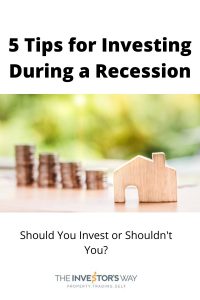Investing during a recession requires that you make some simple adjustments to your strategy. The good news, however, is it doesn’t mean you have to stop investing. In fact, a recession is often the time when you will plant the seeds for some of your greatest investing returns.
There is no doubt that we are living in interesting and different times. It is hard to know what to believe. The mainstream media clearly have their motivations, which are normally based in fear, and social media is a mix of all types of news, conspiracy theories and let’s face it, lunatics.

So, the first question must be, will we go into a recession?
The resounding consensus is YES, and we may already be in a recession. How can you make the most of these conditions, should you be investing at all, is there such a thing as safe investing during a recession, and what markets or industries should you be investing in?
I am going to suggest answers to all of these questions in this post.
>>> Demystify money and get started with smarter money management, claim your copy of the 21 Days to Money Mastery <<<
“Be fearful when everyone else is being greedy, and be greedy when everyone else is being fearful” Warren Buffet
This is one of my favourite Warren Buffett quotes and one I want you to keep in mind as we delve into the detail of investing during a recession.
What is a Recession?
There are all types of technical definitions of a recession. The one that is most used is two consecutive quarters of negative economic growth.
Economic growth refers to an increase in the size of a country’s economy over a period of time. The size of an economy is typically measured by the total production of goods and services in the economy, which is called gross domestic product (GDP).
Obviously during a pandemic, with so many industries shut down, like tourism, the economy will be shrinking, or recording negative growth.
Should You Invest During a Recession?
It is important to acknowledge that recessions are not uncommon. Over history they have occurred many times, and they will continue to occur in the future.
And as our quote above from Warren Buffett suggests, a recession may just be an ‘opportunity’.

The important thing to note about investing during a recession is to observe and understand human behaviour.
There are certain things that we human do, repeatedly, that offer signs or flags of what will happen in a recession. Knowing these signs will lead you to what investments will do well, and therefore, how to obtain above average returns.
So the simple answer, is YES, you should be investing during a recession. In fact, it could be the most profitable time of your investing journey.
How to Make the Most of a Recession?
I mentioned above that you need to observe human behaviour to identify what industries will thrive in a recession.
Let’s look at what that means…
There are certain things that don’t change during a recession. Like our need for food, clothes, shelter, health care, and utilities, that is water and electricity.
Then there are those industries that outperform because we change our behaviours. In a recession, people become more conscious of their spending as money is tighter. So, things like repairs and maintenance are more prominent then new purchases, that is we fix things more often.
With money being tighter, there is less for entertainment and going out. Things like chocolate, alcohol and tobacco tend to do better as people spend more time at home instead of at restaurants and bars. We use these items as a stress release or emotional comfort.
Another segment that has the potential to outperform are discount retailers. As we tend to tighten our belts during a recession, discount retailers outperform as people seek out bargains and discounts.
Of course, people will continue to maintain their health. However, with a pandemic in the mix, there is a worldwide race to develop vaccines and medications that will see some pharmaceutical and bio-tech companies generate significant gains, once the solutions are available.
As I have said before, investing doesn’t have to be difficult, just observing human behaviour can offer the signals that will deliver you above average returns.
5 Tips for What to Invest In During a Recession
To determine the best options for your investment dollars in a recession, we look at history, human behaviour and current events.
Firstly, history, which tells us that companies that operate in the industries mentioned above will outperform.
Second, human behaviour, which tells us that during a recession, people will change their habits to reflect the tighter money scenario that they are facing. It isn’t business as usual.
And third, we look at current events, like the race for vaccines, the need to spend more time at home and the current trends.

In this case, there are many companies that have changed or added to their outputs to meet current demands. For example, look at how many companies are now producing sanitiser. Current events will cause companies to adjust where they can to meet demand.
In terms of the need to spend more time at home, there is evidence building that people are looking for larger homes again, to accommodate the fact that families will be home for longer periods, more members of a household will be working from home and potentially more extended family members will be living under one roof to meet health care needs.
This may be a surprise, however history will show that property is a key asset for investing during a recession.
So here are my top ten tips for what to invest in during a recession…
Number One: Property
I have already mentioned some of the reasons that property is going to be a good investment. It is however important to note that there will also be some pain in this sector…
During a recession there are likely going to be some people that can’t meet their mortgage requirements and there will be some forced sales. These sales normally result in a reduction in price, which can spread across the whole market.
There is a good chance there will be a dip in the market, that investors can take advantage of to get into the property market at depressed prices. You do this knowing that the depressed prices won’t last long, and when the economy begins to come out of recession, you will see some aggressive capital growth.
This might be counter intuitive, but a good asset to consider if you are in the position to access borrowed money, or even better, pay with cash.
Number Two: Precious Metals
Precious metals are what I would call a defensive investment. What that means is that they normally perform well when everything else is struggling. Precious metals like Gold and Silver are often referred to as the ‘flight to safety’ investment.
We are already seeing some of this in the price of Gold as it reaches levels not seen since 2012.
Having some of your portfolio in a defensive asset like precious metals can also provide your portfolio with a great boost, because when they go on a run, they go hard and quickly.
Number Three: Recession-Proof Stocks (The Counter Cyclicals)
I’ve already outlined in the section how to make the most in a recession what market segments to look at for stocks.
These stocks that are going to perform well in a recession are called counter cyclicals, because they do well when the economy isn’t doing so well. It means you will likely lighten your holding of these stocks once the economy recovers, but for now, they are the magic.

To recap, the market segments to look at are:
Consumer staples – which are your food, personal hygiene (toilet paper – don’t get me started), cleaning products
Health Care – this includes all related industry to the health care market, like nursing homes, medical supplies, funerals, pharmaceuticals and biotech.
Utilities – power and water, which historically in Australia at least have been Government owned, but now are more and more publicly owned, meaning you can invest in them.
Service and Repair – look for companies that provide maintenance and repair services, particularly in the whitegoods and IT markets.
‘Sin Industries’ – this is not my term, and is one that is quite old, it refers to things like tobacco and alcohol. You can throw in chocolate as well and you have the comfort and emotional support products that people will continue to buy.
Number Four: Dividend Paying Stocks
While a number of stocks will struggle to pay dividends during a recession, or may dramatically cut their dividends, it is important for those that rely on dividends for income to continue to seek out companies that will provide this income.
The point here is that during a recession, stocks that have historically paid dividends perform better, and work hard to maintain dividends where they can.
>>>>> Learn how to select stocks, property and precious metals in the Investing Bootcamp course<<<<<

Number Five: Bonds
The bond market is another of the so-called defensive plays. It’s not intended to be a long-term investment. Instead it is about taking advantage of higher interest rates (normally) during a recession and having some of your money in a cash investment.
Bonds are not as flexible as a term deposit; however, they will typically pay more interest.
I was nervous to include bonds in this list, mainly since rates in bonds have been doing crazy things lately, and normally they require a larger sum to get started. The good news however is that you can find ETF’s that are tracking bond markets and therefore more affordable to enter.
The key to these tips and investing during a recession is to ensure you diversify. Obviously, that is always important, however during a recession it is even more important as you seek to minimise your risk, and gain exposure to the markets that will out-perform.
Conclusion
The first thing that needs to be said about investing during a recession, is not to panic. Refer to Warren Buffett’s quote and remember that you are in it for the long haul. The only people that lose money in a recession are those that sell their stocks or properties.
We know that stock and property markets recover from recessions, and normally very quickly.
Acknowledge that as humans we are creatures of habit, and as such, we can rely on history to show us the way forward.
Use these tips to guide you in your decision making and be mindful of the fear-mongering that you will hear and see in the mainstream media. They are not known for their ability to pick markets and are more interested in growing audiences, which unfortunately comes from fear. We are strange in that way.
Let me know in the comments which are your favourite tips.
